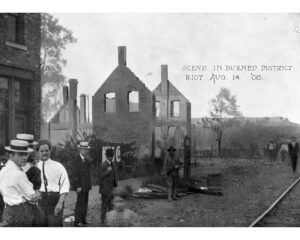
The Past That Persists: The Springfield 1908 Race Riot National Monument Designation
On August 16, 2024, in the presence of civil rights leaders, community members, and elected officials, President Biden used his authority under the Antiquities Act to designate the Springfield 1908 Race Riot National Monument. The designation was made during the 116th anniversary of the racist riots in Springfield, IL that resulted in ...
Read More
Read More

Congratulations to the Winner of The Journal of the Civil War Era’s 2024 George and Ann Richards Prize
Tian Xu has won the $1,000 George and Ann Richards Prize for the best article published in The Journal of the Civil War Era in 2023. The article, “Chinese Women and Habeas Corpus Hearings in California, 1857–1882 appeared in the December 2023 special issue, Transpacific Connections in the Civil War Era, ...
Read More
Read More

Joining Forces: Seven Take-Aways from a Biennial Meeting Roundtable
Many of us love the idea of close cooperation with the National Park Service (NPS), and of forging ties between academics and public-facing historians more generally, but we are not always sure how to put those ideas and intentions into tangible, sustainable practice. At the Society of Civil War History’s ...
Read More
Read More
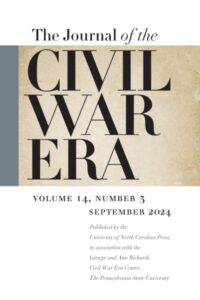
Editor’s Note for September 2024 JCWE
The September 2024 issue continues to demonstrate the vitality and creativity of the fields that touch on the Civil War era and the vibrant discussion of methods, sources, and arguments that shape its future. There are reasons for concern—or even gloom—about aspects of the broader culture, including attacks on teaching ...
Read More
Read More

Civil War Bluejackets: Citizen Science, Machine Learning, and the US Navy Common Sailor
The “digital turn” in Civil War era history has now reached the age of artificial intelligence (AI). ). In 2022 Cameron Blevins and Christy Hyman challenged historians “even self-professed Luddites—to approach today’s shifting technological landscape with the same intellectual curiosity and rigor that they bring to their studies of the ...
Read More
Read More

Pete
We grieve the sudden death of our dear friend and distinguished historian, Peter S. Carmichael. As nearly everyone in the SCWH knows, Pete brought a rare invigorating spark to everything he touched. Those lucky enough to interact with him encountered historical insights, probing questions, and his profane and hilarious sense ...
Read More
Read More

“Acts of Lawless Violence”: The Office of Indian Affairs, and the Coming of the Civil War in Kansas
On November 26, 1855, Indian Agent John Montgomery hand delivered a notice to the wife of George W. Gray, warning the squatters that they were now “required to abandon your ‘claim’ or ‘location’ on the Half Breed and Kansas Indian Reserve on the Grasshopper Creek.” If they ignored this official ...
Read More
Read More

Greetings from the New Editor
Greetings JCWE community, I am Robert Bland and I am excited to be joining this robust online community around Muster as the Journal’s incoming associate editor for digital content. As a prior contributor and longtime reader of Muster, I deeply value the digital world that has been curated by the ...
Read More
Read More
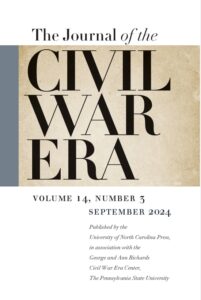
Editors’s Note for June 2024 JCWE
This issue demonstrates the ongoing methodological breadth of the Civil War Era, as scholars bring numerous different ways of approaching history to reckon with the turbulent mid-nineteenth century in all its facets. This issue includes one research article, a book award talk, a roundtable, and a historiographic review essay, along ...
Read More
Read More
Exit Interview with Hilary Green
What has been the most rewarding part of your time with Muster? It has been rewarding to introduce the amazing work of more diverse Civil War era scholars to more diverse audiences of academic, K-12, and non-academic audiences. As such, I have been able to see more people engage with their ...
Read More
Read More

Production by Enslaved Workers and the US GNP
Sad to say, the gulf between economic history and mainstream history is as wide today as ever. Undoubtedly many forces have contributed to this state of affairs, but one historical breakpoint was the controversy over slavery during the 1970s, prompted by publication of Time on the Cross, by Robert ...
Read More
Read More

2024 Tom Watson Brown Book Prize Winner
The Society of Civil War Historians and the Watson-Brown Foundation are proud to announce that Yael A. Sternhell is the recipient of the 2024 Tom Watson Brown Book Award. Dr. Sternhell earned the award for War on Record: The Archive and the Afterlife of the Civil War which was published in ...
Read More
Read More
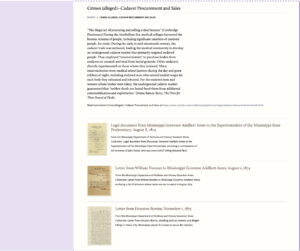
Uncovering Black Voices in Civil War Era Digital Archives: The Civil War & Reconstruction Governors of Mississippi Project
While pondering the future of digital history, historian Edward L. Ayers argues the field should not only replicate archives and build new tools. It must also feature interpretation, explanation, and explication, and when it accomplishes these things, it can contribute original knowledge and perform a democratic service in meaningful and ...
Read More
Read More
Introducing the New Digital Media Editor
The Journal of the Civil War Era is pleased to announce that Dr. Robert Bland will become the journal’s new Digital Media Editor in June. He succeeds Dr. Hilary Green, who served as Digital Media Editor since 2020. Dr. Bland is assistant professor of History and Africana Studies at the University ...
Read More
Read More
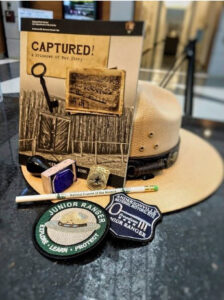
Andersonville is Black History and Reconstruction History (even when the National Park Service Forgets)
Junior Ranger programs are popular educational activities at our national parks. Children complete a short exercise connected to the park’s theme and receive a badge. The best junior ranger programs provoke age-appropriate revelation about the big picture without merely simplifying the material presented to adults. Andersonville National Historic Site’s standing ...
Read More
Read More
How the Federal Government Came to Control Immigration Policy and Why it Matters
The Civil War and Reconstruction transformed immigration policy in the United States, marking the transition from a sub-national to a national policy for regulating the admission, exclusion, and removal of foreigners. Before that turning point, Congress played almost no role in regulating immigration, other than naturalization policy (for white people) ...
Read More
Read More